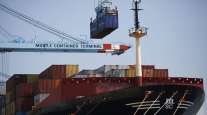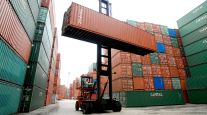Intermodal Group Continues Making Plans for Motor Carrier-Based Chassis Pool
This story appears in the Sept. 10 print edition of Transport Topics. Click here to subscribe today.
Efforts to create a motor carrier-based pool to provide intermodal chassis are continuing, though American Trucking Associations’ Intermodal Motor Carriers Conference said it has not yet decided how to accomplish that goal.
“We continue to move forward, slowly but surely,” Curtis Whalen, executive director of the trade group, told Transport Topics. He set a goal of completing its review of how to proceed by mid-October.
The ATA affiliate said in June that, for the first time, it was exploring what steps were needed to create its own chassis supply approach. Drayage truckers began to weigh alternatives after some ocean carriers started charging a fee for using the equipment that used to be free of charge.
Ocean carriers began to move away from chassis supply when the Federal Motor Carrier Safety Administration implemented changes that made them instead of the trucking firm responsible for chassis safety while on the road.
The latest step the IMCC has taken is to interview outside counsel and consultants to evaluate the legal and commercial options, Whalen said. The group hasn’t yet decided which consultant and counsel to use.
Among the issues to be considered, Whalen said, is the regulatory approach to the pool’s creation, including which agency could regulate a trucker-controlled pool. He also has identified antitrust questions to address.
“It’s been an interesting summer,” Whalen said, as IMCC officials met with three entities that provide chassis today — leasing companies TRAC Intermodal and Flexi-Van, as well as Consolidated Chassis Management, a chassis pool operator. CCM is owned by the Ocean Carrier Equipment Management Association, a trade group whose members include the largest steamship lines.
The CCM pool is governed by the Federal Maritime Commission, which concentrates on regulating ocean carriers and not inland freight movement.
On the other hand, motor carriers are largely deregulated, though the Surface Transportation Board still regulates some activities. The STB, whose primary jurisdiction is freight railroads, oversees an equipment pool of freight cars owned by TTX Co., whose owners are railroads such as CSX and Union Pacific.
Meanwhile, some ocean carriers that are members of the equipment management group continue to take steps to stop providing chassis on their own. The latest changes listed on OCEMA’s website include a transition on Sept. 30 by China Ocean Shipping (Group) Co., also known as COSCO.
Its chassis supply changes affect Charleston, S.C.; Savannah, Ga.; and other Southeast locations where intermodal shipments move by truck.
In total, 16 of OCEMA’s members have changed their chassis supply procedures since 2010, when Denmark’s A.P. Moller Maersk A/S created a subsidiary called Direct Chassis Link, which began charging a fee to use chassis. Its Maersk Line, the largest ocean carrier, previously provided free chassis to truckers.
Some OCEMA members and the two leasing companies provide chassis through one or more of CCM’s seven pools.
While most ocean carriers changed their chassis strategy, some lines such as APL Ltd. continue to provide chassis. APL has said it will phase out its chassis fleet in 2014.




